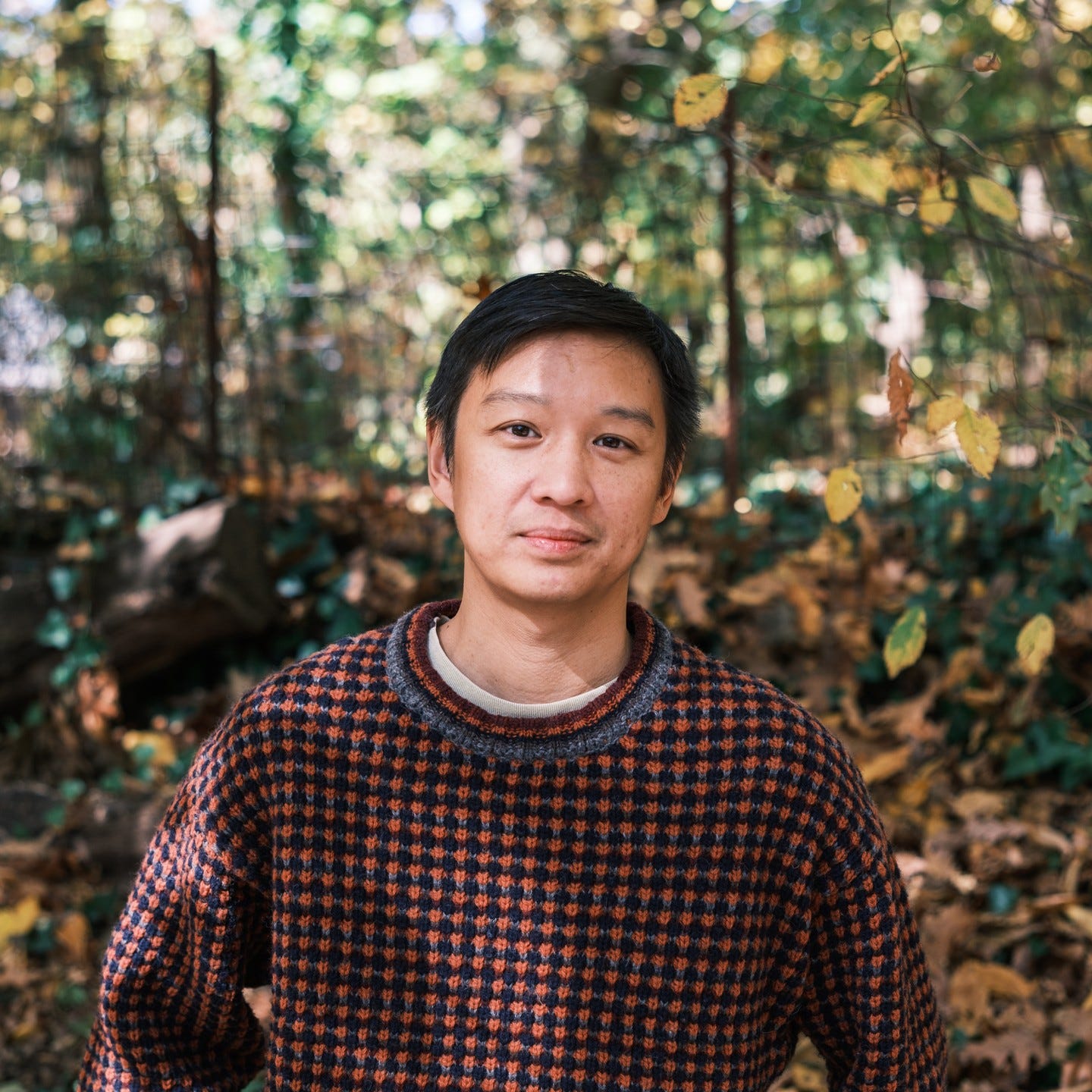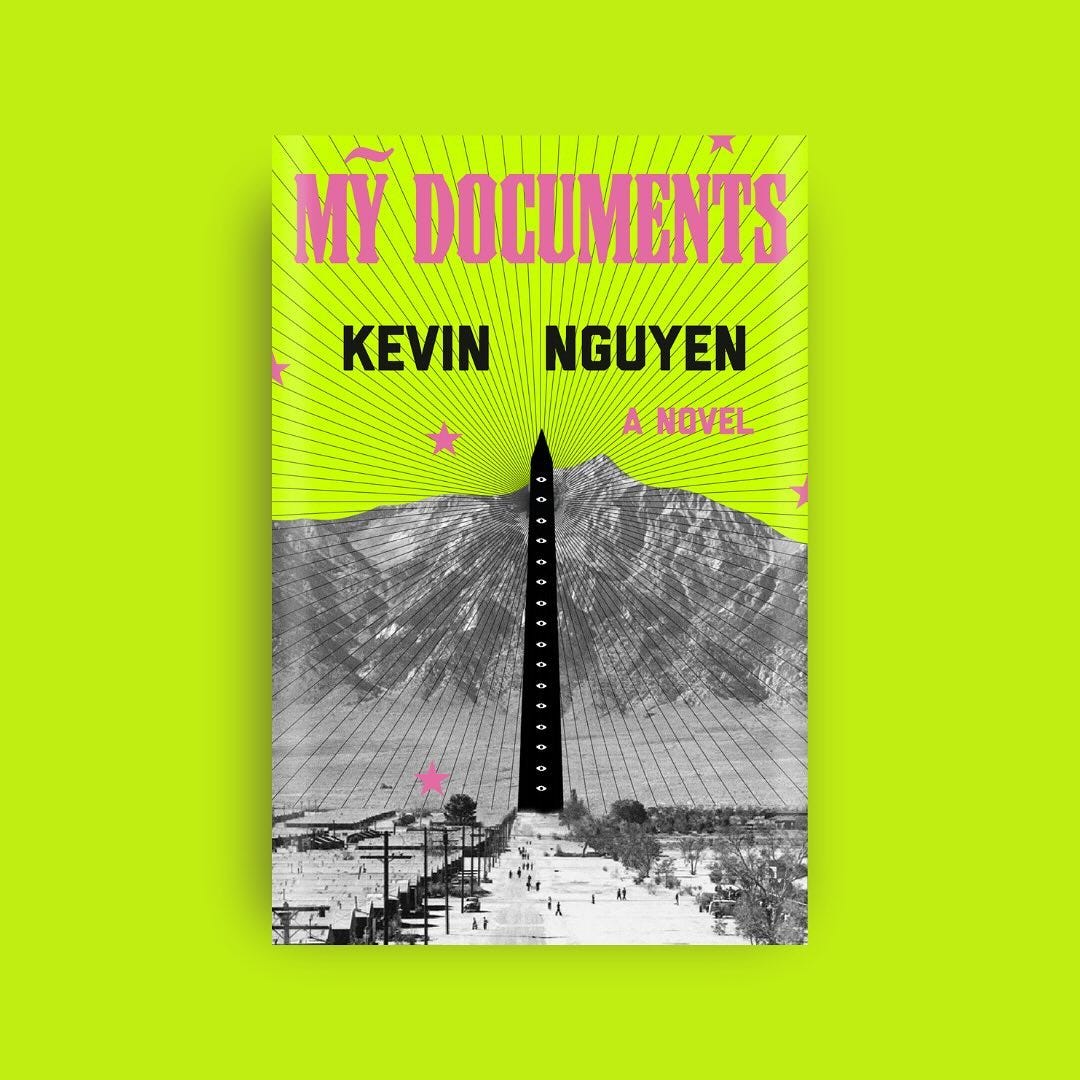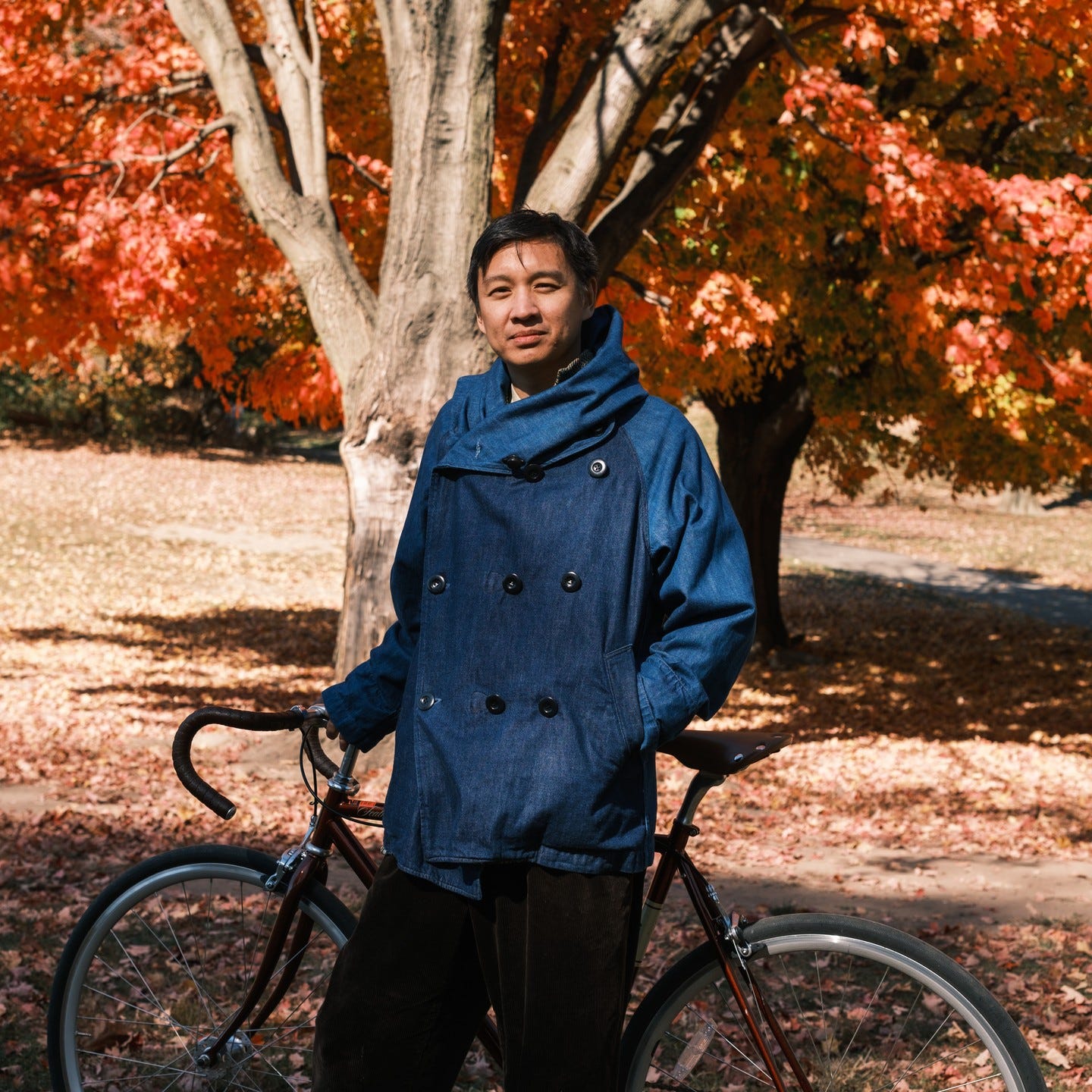Kevin Nguyen: I built a scenario for these characters and then I let it play out
A conversation with the 'Mỹ Documents' author
Welcome to Human Pursuits, the column that features need-to-know names and stories in media and other creative spaces. Today, a conversation with journalist and author Kevin Nguyen.
Last night, I finished Kevin Nguyen’s forthcoming novel, Mỹ Documents.
The good news is that the book feels particularly attuned to this moment in U.S. history.
The bad news is the book feels particularly attuned to this moment in U.S. history.
Against a backdrop of national panic, with the U.S. government detaining Vietnamese Americans following a terrorist attack, the fictional story centres on four half-siblings and how they adapt to their sudden change of circumstances.
Though haunting at times, the book is honestly more of a page-turner than you might expect given the subject matter, with a pacing and tone that often reminded me of writer John Green.
Nguyen, who is also the features editor at The Verge, takes great joy in crafting compelling dilemmas for his characters, and his perspective on modern media feels fresh, albeit slightly controversial.
Clearly, we had much to discuss.
Our edited and condensed conversation touched on Kevin’s affinity for the Pacific Northwest, exit strategies, Careless People, the power dynamics between a journalist and their source, dragnets, the Severance season 2 finale, and more.
ES: Are you in Brooklyn? It feels like everyone cool is in Brooklyn.
KN: Are we cool? I think it’s just where we’ve found ourselves.
ES: I was thinking about that recently. How at one point places like Brooklyn and Austin felt like they were on the come up, but now they’re just established. The secret is out.
KN: I know. It’s so funny that everything has just become Brooklyn. I don’t want to think of it as too influential a place, but every coffee shop here looks like every coffee shop anywhere else, you know?
ES: It used to be where you could live cheap and hang out. Obviously, I don’t live there, but it feels like that’s changed.
KN: I try not to be too judgmental, but I think about a place like Williamsburg. There are high rises everywhere, and the people who move there work in finance and tech, you know? It’s a bit confusing why they want to live here. They don't go to shows or readings or to the movie theater. I’m left wondering what is of interest to them.
ES: When did you move to Brooklyn?
KN: 13 years ago. Right before Hurricane Sandy.
ES: Were you from New York State originally?
KN: I’m from Massachusetts. I actually spent a lot of time in the Pacific Northwest. I went to school in Seattle, and I identify with that part of the country.
ES: Oh baby! I didn’t realize you were an honourary Cascadian
KN: You’re in Vancouver, right?
ES: I am. Which school did you go to? Northwestern?
KN: Northwestern is in Chicago, weirdly enough.
ES: Fuck, really? No wonder they rejected my application. Laughs.
KN: I went to this dinky little school in Tacoma, Washington. I quite liked it. It was a little liberal arts enclave, but I wouldn’t say it was academically rigorous. Laughs.
ES: Sounds perfect, to be honest.
KN: Yeah, I wasn’t a great student in high school.
ES: But look at you now. Published author. Do you think anyone from high school would be surprised by your trajectory?
KN: I’m sure no one I went to school with cares. It was a very PeaceCorps, AmeriCorps, stoner-y place.
ES: Oh, cool. I once had a math teacher tell me I wouldn’t amount to anything because I was always late to her class. It was extremely motivating. I think about her often.
KN: I love that. I feel like most of my life, no one has really cared what I do, or don’t do. I don’t think I even register on people’s radar enough for them to want to kick my ass into gear. I’m like a nobody!
ES: Oh my god, Kevin! That’s kind of sad, but also kind of a sweet spot? It lets you move in silence, without the pressure of expectations.
The journalist has a lot of power when talking to sources.
KN: Totally. I grew up without any pressure. There’s a stereotype that Asian parents are hard on their kids. My parents were not that hard on me. They didn’t care what I did so long as I could pay my rent.
ES: Paying your own rent in 2025 is a wealth signifier. I think it’s what my parents are most proud of.
KN: My parents were refugees, so they have this survivalist mindset. They think anything can change at any moment, which is proving to be pretty useful right now in America. Laughs.
ES: Mom and Dad, you might be onto something…
KN: Not to get too alarmist this early in the conversation, but I have been thinking a lot about what we as a society do when Trump starts arresting journalists, for example. Like, do my colleagues and I just wait here for that to happen? Do we buckle down? Get citizenship in other places? I think everyone I know in journalism is thinking about this stuff, or at least formulating an exit plan in case things get bad.
I never thought I would see this in the U.S. in my lifetime. But then I think back to what my parents were dealing with. That was 50 years ago, it’s not a very long time… It’s just weird. Everything’s happening quite quickly, but you wouldn’t necessarily know it looking around.
ES: I sometimes worry that millennials — not even journalists, but just the average person around our age — are quite cerebral and well-informed, but when it comes to acting on, or addressing, problems, we sometimes fall short.
KN: It’s hard. On one hand, it feels like we don’t do anything. But it’s not always super clear to me what we’re supposed to do. We’ve organized mass protests, though maybe not this time around, and the backlash to that was so strong. This administration is different from other American administrations in that it feels no shame. They just lie and never worry that what they say will come back to haunt them. So far, that strategy is proving effective.
Also, how do you convince people to protest if the government can disappear you? We need to be out in the streets, but on the other hand, we need to protect ourselves.
ES: One thing that struck me while reading the book is that you seem to firmly believe in capital-J journalism and its purpose in the world.
KN: Yes. The book is informed a lot by the dilemmas and the experiences that I’ve had in journalism as a reporter and as an editor. I believe in a Free Press and I believe in journalism. But there’s a feeling that’s hard to evoke, which is that the journalist has a lot of power when talking to sources. I kind of feel like, in most cases, the person who benefits the most in that situation is the journalist. I never want to say this too loudly, because journalists need sources to talk to them. But I explore this dilemma in the book, and I take it one step further by making the source a member of the journalist’s family.
ES: There’s a pretty common perception in Canada that Americans enjoy talking to the media. That’s not always the case with Canadians. People here value their privacy, in part because I think there’s a real fear of the negative outcomes that can accompany going on the record, particularly with the internet. It’s intimidating for people.
KN: It’s a tough time for all parties involved. I think a lot of journalistic institutions are pretty good at protecting their sources, but also the surveillance dragnet is getting stronger and stronger.
ES: The word dragnet appears a few times in the book. How worried should I be about that? Laughs.
KN: I mean, quite. I’ve been reading that new Facebook memoir Careless People —
ES: I’ve heard about that.
KN: It’s quite good. I think there’s a lot of attention paid to the egregious things that, Mark Zuckerberg or Sheryl Sandberg said, which are believable, and kind of funny, but one of my takeaways is that, for so long, Facebook tried to be apolitical. Staff at the highest levels of the company really thought they had no role to play in what happened in the world, and no interest in that. And it makes sense because it’s a hard problem. But they also created the largest collection of personal information that has ever existed.
I don’t know if you have a Facebook account, but users do willingly volunteer a lot of information. Should that excuse the way it gets used against us? There’s this idea that we made the bargain, but I don’t think people make a choice like that. I don’t think that Facebook even understood how it could wield the information it was collecting. It just knew it should collect a lot of it and that one day it would be valuable.
ES: What social media networks do you use now? If you use any.
KN: I’m on Bluesky. It’s nice and it’s well made… But it does feel like it’s grasping at a version of Twitter that doesn’t exist anymore, and will never exist again. That’s what people want. Some people there post like it’s 2014. It’s tough.
I built a scenario for these characters and then I let it play out. Literary fiction, in particular, is great for that.
ES: Maybe it’s better that it’s not as much fun. Maybe we’re moving past the need for that.
KN: What apps are you on?
ES: I use a bit of everything because I’m mentally ill. Laughs. Facebook, Twitter, Blue Sky, Tumblr. I like PI.FYI. I interviewed Tyler Bainbridge a while back.
KN: I like it too. Would you say it’s thriving over there?
ES: I honestly have no idea. I don’t know what a popular post looks like on PI.FYI, which is maybe the point? I’ve had things get a bunch of likes, but I don’t know if that’s considered going viral. I’d rather not know, to be honest.
KN: That’s nice. I used it when it launched. I felt like it had flatlined a bit, culturally, but maybe it’s picking up. I remember someone recommended pizza. Like, come on. Laughs.
ES: A lot of people are going to tell you this book feels timely. I’m wondering: was it at all fun for you to write? I remember talking to about her book, and she said the process flew by because she really enjoyed it. I’m curious as to whether you felt similar.
KN: That’s actually a great question. Honestly, it was extremely fun to write, especially at the beginning when I was first imagining it. Initially, I wanted to write a historical novel about Japanese incarceration, but as I started writing, I wasn’t feeling it. I think the demands of a historical novel are quite different from this. Plus, I don’t even really like reading them…
But I started thinking about that sort of mass incarceration. I wondered, “If it happened today, what would it be like?” The darkly funny thing is, I feel like it would be zoomers wandering around, not understanding the historical context and what was about to happen to them; they’d mostly be complaining about the lack of WiFi. That idea was the centre of the novel, and I started building out from there, building up the characters and their family dynamics. That part was really fun. You can distance yourself from this dark, imagined world because you have control over it.
ES: I get that. World-building is kind of like creating your own puzzle and solving it at the same time.
KN: Totally. I built a scenario for these characters and then I let it play out. Literary fiction, in particular, is great for that. All your characters get to act like humans, who would, hopefully, do the things that you or I would do.
What I didn’t imagine was that, by writing this, I doomed myself to talking about the influence of Japanese incarceration and migrant detention for the rest of my life.
ES: I only have a couple more questions for you. And I guess this isn’t even a question, but a comment: I noticed you went through the pains of titling every chapter in the book. That’s a little unusual.
KN: You’re right, you don’t see that too often at the moment. I knew for momentum and narrative purposes that I wanted each chapter to be short. I think for a chapter to work, it has to move things forward, but also stand on its own. Naming was a convention for me, because the title usually encapsulates two ideas contained in the chapter, or maybe an idea you don’t expect. They started out as markers while I was writing, but as I assembled the manuscript, I decided to keep them.
ES: It makes the whole thing feel episodic. Are you having any conversations about adapting it for television?
KN: I am, actually. My first book, New Waves, got optioned, which was so crazy to me. It has a plot but barely. It’s this weirdly structured grief novel… But I got involved with writing the TV version, which was quite gratifying. It wound up getting killed in the writer’s strike, but I was still happy with that process, and I think I brought a little bit of that energy into Mỹ Documents.
ES: Speaking of TV, I guess my last question is: are you watching Severance, and, if so, what did you think of Season 2?
KN: I am watching it. I’m a little shocked by how much people liked the Season 2 finale. There are a lot of things that I enjoy about the show; the acting is pretty incredible, and most of the writing is pretty strong. But I also think it’s obsessed with being this Lost-era puzzle box that is so clearly never gonna pan out. The part that killed me early in the season is when they got to the goat room. I thought, “This show is about nothing.” And people say, “Well, they brought the goat lady back at the end,” but that doesn’t mean it’s about anything.
I think the first two seasons made it clear that they’re good at writing towards the last shot or last moment of the finale, and those are kind of all people remember. People aren’t going to remember the truly horrible [Harmony] Cobel solo episode. They’re going to remember Mark and Helly running through the hall at the end. Maybe that’s what good TV is to some people, but I think it’s pretty bad storytelling.
Kevin Nguyen is a journalist and the author of Mỹ Documents, out April 2025. He lives in Brooklyn.





